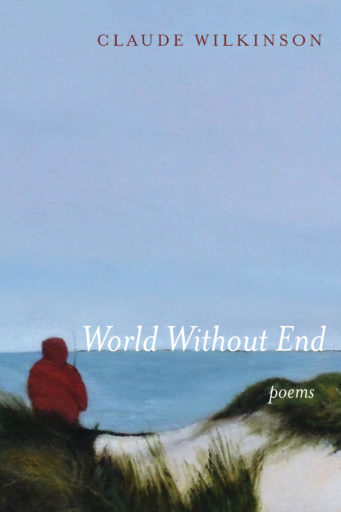

NOW AVAILABLE! Correspondence with My Greeks is a work at once deeply human and hauntingly transcendent, the full flowering of the poet’s lifelong devotion to the generative power of the word.
| Hardcover | ISBN 9781639821723 | $34.00 |
| Paperback | ISBN 9781639821716 | $18.00 |
| eBook | ISBN 9781639821730 | $12.99 |
Citing a line from Elizabeth Bishop—“The bight is littered with old correspondences”—Scott Cairns avers: “So, also, is my mind.”
Indeed, it was Bishop’s “The Bight”—encountered late in his undergraduate education—that may have first alerted Cairns to one, key, salutary fact of literary history: virtually every work written over the centuries has been to some degree a responsive text, something of an epistolary response to what the writer beholds—the landscape, the heavens, or—as in most cases—another prior text.
In addition to volumes by Coleridge, Keats, Bishop, Dickinson, Frost, Stevens, and Auden, Cairns keeps collections by his beloved Greeks—Kavafy, Elytis, and Seferis—on his writing desk. In corresponding with them, he engages some of the profound and recurring themes of his distinguished career: the mystery of creation (and its absent/present Creator), the sense that every word—every term—proves to be less a terminus than a point of departure, and a vision of inexhaustible Love transcending all apparent limits, all neat binaries, including that of heaven and hell. These poets have served as his mentors, his provocateurs, and—in his mind at least—his primary audience.
Correspondence with My Greeks is a work at once deeply human and hauntingly transcendent, the full flowering of the poet’s lifelong devotion to the generative power of the word.
I’ve been reading—and relying on—Scott Cairns’s poems for thirty years. He is one of those rare poets in whose work you feel a whole life underlying and fortifying every utterance. His work has reached far beyond the poetry world into the lives of readers who know poetry can be a source not only of delight and wisdom, but of survival.
Christian Wiman, author of Zero at the Bone: Fifty Entries Against Despair
How does a poet face mortality? Poets like Keats and Hopkins, Elizabeth Bishop and Scott Cairns, face it alone and in company, binding themselves to the immortal through words, through correspondences. Prayers rise from and return to prayer; poems emerge from and fall back to poetry. As Cairns demonstrates in this characteristically wry yet weighty new collection, language begets language, casting itself urgently into the past and future at once, seeking—and finding—the divine. As it speaks back through his own life and a century of Greek poetry, Cairns’s language finds and deploys faith, paradox, low and high discourse, an “elegance” he attributes to Kavafy but makes, as a true poet will, his own. In doing so, he shows that the work of the poet is ongoingly human and mortal: at once solitary and gloriously companioned.
Katharine Coles, author of The Stranger I Become
These poems—or palimpsests—take shape where “our lost beloveds gather / along the far bank murmuring.” Cairns sustains conversations with a host of modern and contemporary Greek poets whose words deliver him to the instruments of his own art and encourage him to “praise all that has set us briefly here.” The distinctive Scott Cairns manner abides—subtle undulations of syntax mapping a topography of belief—while these poems extol what is found in translation, in writing as an outcome of joyful reading.
Christopher Bakken, author of Eternity & Oranges
In his latest book, Scott Cairns understands that all poets are makers but also that the poems they make are always responding to what is already made. Correspondence with My Greeks brings together poems that correspond with Cairns’s favorite Greek writers; that, moreover, are consonant with the feelings provoked by his reading of those writers; and are poems that respond wholeheartedly (as in a letter) to writers by way of Cairns’s personal concerns. Cairns is one of our most authentic and skillful religious writers, and what the Cairns reader expects is all here: his wit, his humor, and his love of words and word play; his accurate and original images of the natural world; his participation in the fraught world of humanity and politics; and, of course, his overriding belief in the “superabundance [that] appears to hold / hegemony over the demons of deprivation.” This superb, highly personal book is the work of a mature writer who knows we are always setting off and arriving and then setting off again; who hopes his poems are a constant prayer to be awake as the Lord approaches; and who understands that his life (and all our lives) “appear as a confusion / of compassions and judgments, kindnesses / and cruelties, consolations and regrets” as we make our way among the mysteries of being here. This is a superb book.
Robert Cording, author of In the Unwalled City
Reading this marvelous book, I’m not only reminded of the wonders of twentieth century poetry written in Greek (Kavafy, Elytis, and Seferis, for starters) but also of what a joy it is to read Scott Cairns’s work. He rises to the occasion of these correspondences with seeming effortlessness; he too approaches “the world’s extravagant bouquet” and dares to press the “stillness for a sign.”
Jacqueline Osherow, author of Divine Ratios